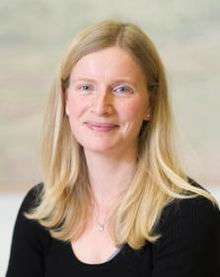Thalia C. Eley
Thalia Catherine Eley is a Professor of Developmental Behavioural Genetics at the Institute of Psychiatry's MRC Social, Genetic and Developmental Psychiatry Centre, King's College London.[1] Her work focuses on the interplay between genetic and environmental factors on the development and treatment of anxiety and depression.

Academic career
Eley began her academic career studying BA Psychology (1989-1992) at Cambridge University. She then undertook her PhD at University College London's Institute of Child Health; her thesis [2] is entitled 'Aetiology of emotional symptoms in childhood and adolescence: Depression and anxiety in twins'.
Employment
Eley held a post-doctoral position at the Institute of Psychiatry's SGDP from 1996-98. Following this she was funded by two Medical Research Council (MRC, UK) fellowships; the first as Research Training Fellow with status of Lecturer (1999-2002) and the second as Research Fellow with status of Senior Lecturer (2002–08). From 2008-09 Dr Eley was Senior Lecturer at the SGDP, then Reader in Developmental Behavioural Genetics from 2009-2013. In April 2013 Eley was made Professor at the IoP, where she directs the Emotional Development, Intervention and Treatment lab EDITlab.[3]
Research background
Eley specialises in both gene-environment interactions on the development of anxiety and depression and she has considered the role of cognitive biases in the development of anxiety and depression in the context of genetically sensitive designs, using both quantitative and molecular genetic approaches.
Currently her twin research includes continuing analyses of the longitudinal twin study, G1219. She is also working with Tom McAdams using the “Children of Twins” approach to investigate the transmission of anxiety and depression from parents to children. Her molecular work currently focuses on two projects exploring the role of specific genetic markers in response to psychological therapies, including cognitive-behaviour therapy for child anxiety and exposure therapy for adult phobias. Regarding cognitive biases, she is currently working on attention bias modification in child anxiety.
Journal articles
Eley has published over 140 articles in academic journals.[4]
Honours and awards
Eley was awarded the Spearman Medal for outstanding published work in psychology within 10 years of graduation, from the British Psychological Society (2002), for work published from her PhD thesis.[5][6] Eley was awarded the Lilly-Molecular Psychiatry Award for the best original research submitted by a young investigator (2004) for her work on the role of gene-environment interactions and the development of anxiety and depression.[5] Papers published on her childhood anxiety study led to Eley being awarded the Macquarie University Research Excellence Award (2011).[5] On 1 April 2013 Eley was made Professor at the Institute of Psychiatry.[7]
References
- ""IoPPN webpage"".
- Eley, Thalia (1996), Aetiology of emotional symptoms in children and adolescents : depression and anxiety in twins (PhD thesis), University of London
- EDITlab homepage
- "Thalia Eley - Research Portal, King's College, London". Kclpure.kcl.ac.uk. 2013-02-01. Retrieved 2014-03-26.
- "IoP: staff: Eley, Thalia C". Iop.kcl.ac.uk. doi:10.1038/tp.2012.33. Retrieved 2014-03-26.
- "Spearman Medal". Hopc.bps.org.uk. Archived from the original on 2013-12-11. Retrieved 2014-03-26.
- "King's College London - Inspiring Women: professors at the Institute of Psychiatry". Kcl.ac.uk. Retrieved 2014-03-26.